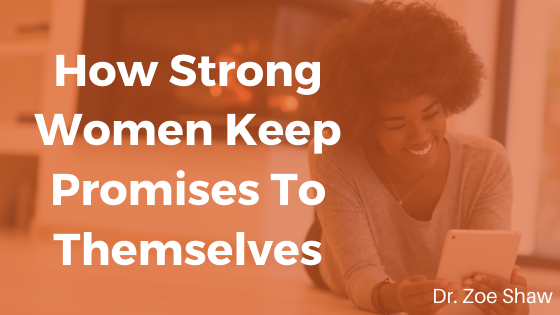Do you make a promise to yourself and break them over and over again?
When you don’t keep your promises to yourself, you send a powerful message to yourself about your trustworthiness. When you don’t trust someone, it permeates into all areas of trust with them and this disrupts your relationship with yourself and your relationship with others.
In short, when we don’t keep our promises to ourselves, we lose trust in ourselves.

On the flip side, as you keep your promises to yourself, you build trust, you develop self-integrity and it radiates into all areas of your life and the world.
You may be thinking, but I’ve already messed up so many times and I don’t trust myself. How can I fix this? Is it even fixable? The answer is yes. Overnight? Certainly not, but over time? Absolutely!
It starts with making some changes in how you relate to yourself. Creating rules of engagement that respect your relationship with yourself because your self-relationship is the driver for all of your other ones.
Here are some tips to implement to help you gain back self-trust:
1. Don’t make a promise you can’t keep.
Many of us are very good about being careful not to promise something to our children, our friends, or colleagues that we can’t follow through on. We know how important our reputation and trustworthiness is in the world. But we often don’t think twice about disappointing ourselves. We rush into promises that we haven’t created the infrastructure to even uphold.
So, before you begin to make a commitment to yourself, ask yourself, “Is this is realistic?” “Can I really do or not do the thing and maintain it?” If not, don’t commit, but instead, find a smaller action towards that goal that you can commit to.
Remind yourself, I want to be trustworthy and I am committed to gaining my trust back.
For instance, I like to write down all of my self commitments as a reminder. And they are time sensitive. I rarely say- from now on. Instead, I say I am choosing this for this period of time.
For the next 4 weeks, I will wake up every morning at 5 am to write or I will cut grains from my diet. Here is why. If I embark on this regimen and I don’t like it or it isn’t working for me, I know I can quit in a month. But I won’t quit it right now because I made a commitment and there is something to be gained in sticking it out. If I say, from now on, I am setting myself up for failure.
When I make these changes, I add a written declaration to myself.
I am doing this because I love myself.
2. Never, ever use the words “I hope” when it comes to yourself. You are the one and only entity in this world that you can control.
You can hope that things will happen, you can hope that others will behave or react a certain way, but you can’t hope that you will do something. When you use that language, “I hope I can stay on this diet,” or “I hope I won’t overreact,” You are making a direct statement to yourself that you are not in control of yourself and are therefore not trustworthy. No more hoping about your own behavior, okay? Replace those words with “I choose.” “I choose to react calmly.” “I choose to stick to this eating plan for this week.” I don’t care if it’s a day and you need to make that choice anew every day. Take your power back and use the words “I choose.”
3. Make choices, pacts and promises to yourself that are not based on a moment of time or something external to yourself.
For example, I need to lose weight for that event or to fit in that dress…
What happens when the event is over or you’ve worn the dress? Your accountability just disappeared. Your why just disappeared- and you wonder why you regressed. Your why must be bigger if you want to maintain it beyond a specific event. If you don’t, then make it clear to yourself and that builds trust too.
When you can’t pin someone down and they are super vague, you don’t trust them. Same goes for yourself.
When someone breaks a promise to you, it’s not easy or wise to immediately trust them again- it works the same with your own broken promises to yourself. You have to earn your trust back in baby steps with consistency over time. But you can and will trust yourself again.
Train yourself to change your habits. Don’t rely on your emotion or your urges. They will betray you every time when it comes to willpower to change behavior.

4. Strong women don’t ask themselves if they feel like it. It’s an irrelevant question when you’ve made a commitment.
I trained for the NY marathon by never asking myself that question when the alarm went off at 4 am. There will be times when it is inconvenient when you don’t feel like it, when it doesn’t even feel good anymore, when you question why you’re even doing this. That’s okay. This is a promise you made to yourself and you can evaluate all that later, but don’t ask yourself in the moment of implementation whether you feel like it.
And last, spend some time with yourself. Ask yourself questions. Get to know yourself and you will plan better and make wiser, more loving choices for yourself. This also builds trust. It’s important to first acknowledge that you have a relationship with yourself. You have an obligation to yourself and your relationship takes maintenance – as do all.
This is you taking care of yourself. You are working against an unhealthy drive that is not, at the core, who you are. You are not the enemy. You are your friend and you can be a good mother to yourself.
If you fall off the wagon, jump right back on. It’s time to learn to trust yourself again, sis.
You’ve got this, my friend!
Share this Post

